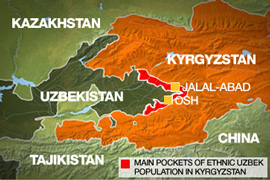US seeks Kyrgyz refugees’ return
Envoy calls for probe into causes of violence that sparked exodus of ethnic Uzbeks.

UN appeal
Fighting between Kyrgyz and ethnic Uzbeks has killed at least 200 people since it erupted a little over a week ago. But Otunbayeva said on Friday that the death toll could be 10-times more than the official figure.
| IN DEPTH | |||||||||||||||||
|
The United Nations has issued an appeal for $71m in humanitarian aid for Kyrgyzstan, where more than 400,000 people have been displaced by the fighting.
The UN Office for the Co-ordination of Humanitarian Affairs (OCHA) said the appeal would provide aid to nearly 1.1 million people affected by the violence.
Ban Ki-moon, the UN secretary-general, has said there are shortages of food, water and electricity in the violence-hit areas.
“Hospitals and other institutions are running low on medical supplies,” he said.
An aid appeal for neighbouring Uzbekistan, where about 100,000 refugees have taken shelter, would be launched next week, Ban said.
Barricades removed
His comments came as Kyrgyzstan’s security forces moved to pull down Uzbek barricades put up during riots in the southern city of Osh.
Al Jazeera’s Robin Forestier-Walker, reporting from Bishkek, said some of the Kyrgyz forces were believed to be trying to get access to a fuel depot situated inside a neighbourhood in Osh.
“The depot was seized control of by ethnic Uzbek members of the neighbourhood,” he said.
“They were trying to use that as a bargaining chip to ensure their safety.
“Because everywhere you go in Osh, the Uzbeks that you speak to believe that they are under attack and need to defend themselves from marauding gangs that have been causing such violence and devastation.”
‘Outside elements’ blamed
For his part, Islam Karimov, Uzbekistan’s president, accused “outside” elements of instigating the violence, saying neither ethnic Uzbeks nor Kyrgyz were responsible for starting it.
“Neither Uzbeks nor Kyrgyz are to blame for this,” he was quoted as saying by the official Uza news agency on Saturday.
 |
“These disruptive actions were organised and managed from outside.
“Forces that organised this subversive act tried to drag Uzbekistan into this standoff.”
Kyrgyzstan’s interim leadership has blamed Kurmanbek Bakiyev, the country’s deposed president, of masterminding the violence.
Hillary Clinton, the US secretary of state, echoed those allegations, saying Bakiyev may be to blame.
“Certainly, the ouster of President Bakiyev some months ago left behind those who were still his loyalists and very much against the provisional government,” she said in remarks posted on the US state department website on Saturday.
“There certainly have been allegations of instigation that have to be taken seriously.”
Bakiyev, now in exile in Belarus, has strongly denied any involvement in the events.
